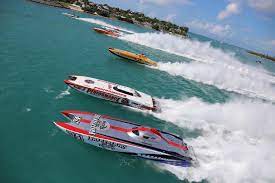As you speed across the ocean waves, have you ever thought about the incredible marine life that lies beneath your hulls? As a powerboat enthusiast, we must protect the marine ecosystem. In this article, we’ll share four ways you can keep the marine ecosystem healthy.
1. Conduct routine boat maintenance
Boats that aren’t adequately maintained can release dangerous exhaust fumes laden with nitrogen oxide and sulfur dioxide. When these toxins mix with water vapor, they create acid rain, which can wreak havoc on marine life. Regularly maintaining your boat can help prevent such environmental devastation and protect our precious marine ecosystems.
2. Use eco-friendly cleaning products
When washing your powerboat, choose eco-friendly cleaning supplies. Doing so could avoid adding harmful chemicals to the marine ecosystem. Biodegradable soaps and non-toxic cleaning agents help reduce water pollution while keeping your vessel looking great.
Another thing you can do is to use alternative cleaning products. These can often be made from common household ingredients, reducing waste and cost. The homemade powerboat cleaning products that you can use can include:
Vinegar solution
Ingredients: White vinegar, water
Mix equal parts white vinegar and water in a spray bottle. This solution effectively removes hard water spots, mineral deposits, and mildew stains. Simply spray the vinegar solution on the affected area, let it sit for a few minutes, and then wipe it off with a soft cloth or sponge. Rinse the area with clean water and dry it thoroughly.
Baking soda paste
Ingredients: Baking soda, water
Create a thick paste by mixing equal parts baking soda and water. This paste works well for cleaning non-skid surfaces and removing rust stains from metal surfaces. Apply the paste to the surface using a soft brush or cloth. Scrub gently, rinse off with clean water, and let it dry.
Remember to follow safety precautions when using homemade cleaning solutions. Always test them on a small, inconspicuous area first to ensure they don’t damage your powerboat’s surface.
Dispose of water responsibly
Never throw trash or other waste materials overboard while out at sea. The waste materials we throw into the ocean have adverse effects on the health of marine animals. Fishing gear, plastic bags, bottles, and other commonly discarded items can cause injury or even death to many creatures.
Keep our oceans clean by refraining from tossing trash overboard while sailing. The debris that we carelessly discarded into the deep blue sea can significantly impact the well-being of its diverse marine life. Abandoned fishing gear, plastic bags, bottles, and similar items can lead to injuries or even the tragic loss of these precious creatures.
Additionally, manufactured waste lurking in the waters takes a heavy toll on tourism and fisheries economies. This cuts off income for communities that depend on these industries to make a living.
You have the power to be a changemaker. Just grab your own trash bag when you head out, making sure to dispose of any waste thoughtfully. Your conscious effort can contribute significantly to tackling this pressing global issue.
4. Choose environmentally friendly fuel
Did you know that diesel engines are responsible for causing acid rain? This happens because of the high levels of toxic gases called nitrogen oxides (NOx) and sulfur oxides (SOx). When they mix with moisture in the air, they turn into acidic compounds and fall back down as rain. This harmful downpour affects water systems, forests, soil health, and our beautiful buildings and monuments.
Diesel engines also contribute to global warming. These same NOx emissions create ground-level ozone in the troposphere—a potent greenhouse gas. Combine that with other greenhouse gases like carbon dioxide (CO2), which are also released by diesel engines, and we have ourselves a big problem with rising global temperatures—and all the negative impacts that come with it.
Alternative fuel options like biodiesel can provide an environmentally friendly solution for fuel consumption. Biodiesel is an eco-friendly choice made from plants or animals. It’s not just biodegradable and non-toxic; it also releases fewer harmful substances than regular diesel. Its low toxicity also means it’s kinder to our marine friends.
Next time you consider fuel options, remember that biodiesel is healthier for our planet and everything living on it.
Reminder
Do your research before using biodiesel, and check if this fuel is compatible with your vehicle. With different blends out there, from B20 (20% biodiesel, 80% petroleum diesel) to the pure eco-goodness of B100 (100% biodiesel), there’s a lot to choose from.
Most diesel vehicles and advanced tech engines can easily handle B20 or lower mixes. To be on the safe side, though, look at your owner’s manual to find out about the best blend for your powerboat.
Keep in mind that using the wrong fuel may void any warranties or even cause engine damage. Always seek professional advice and refer to your owner’s manual before making the switch.
Conclusion
As you enjoy powerboating, feeling the wind in your hair and the salty spray on your face, don’t forget about the amazing marine life thriving below the surface.
Keep your boat in top shape through regular maintenance. You can also make a difference by swapping out your usual cleaning products for gentle, eco-friendly alternatives.
Take responsibility for your waste disposal habits while at sea. The harmful effects of improperly discarded waste on marine life, the environment, and economic sectors like tourism and fisheries are substantial and far-reaching. You want to minimize the negative impact on marine ecosystems and the livelihood of communities that depend upon them.

